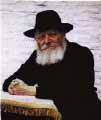Rabbi Menachem Mendel Schneerson

(1902 - 1994)
Rabbi Menachem Mendel Schneerson, known as "the Rebbe," was the leader of the Chabad-Lubavitch movement and is one of the most recognizable men in Judaism.
Rabbi Schneerson (born April 18, 1902; died June 12, 1994) was born in Nikolayev, a town in the southern Ukraine. His father,
Rabbi Levi Yitzchock Schneerson, was a renowned scholar, while his mother,
Rebbitzen Chana Schneerson, was an aristocratic women from a
prestigious rabbinic family. He had two younger brothers, Dovber and
Yisroel aryeh Leib.. When Menachem Mendel was five years old, the
family moved to Yakaterinoslav, now Dnepropetrovsk, where his father
was appointed chief rabbi.
From early childhood, Menachem Mendel displayed
prodigious mental acuity, leaving school for private tutoring. By the
time he reached bar mitzva, he
was considered a Torah prodigy,
and during his teenage years, he immersed himself in the intricacies
of Torah study. In 1923, he met Rabbi Yosef Yitzchock Schneerson -
then the Lubavitcher Rebbe- who drew him into his inner circle giving
him various responsibilities; five years later, in Warsaw,
he married the Rebbe's second eldest daughter, Chaya Mushka
(1901-1988).
A short while later, the couple moved to Berlin,
where Rabbi Menachem Mendel had already begun studying mathematics
and science at the University of Berlin, Because of the Nazi rise, the young Rabbi and his wife left Berlin in 1933 for Paris, and
he continued his studies at the Sorbonne. Primarily, however, he
immersed himself in prayer and religious study, and was referred to
by his father-in-law on various matters, including the preparation of Lubavitch publications. He also served as his father-in-law's private secretary
and traveled on his behalf to visit various Jewish leaders in Europe.
When the Nazis occupied Paris, the couple was
forced to escape the city. On June 23, 1941 they arrived in New York,
where Rabbi Yosef Yitzchock Schneerson appointed his son-in-law head
of Lubavitch's educational arm, as well as the movements
social-service organization and its publishing house.
In 1950, Rabbi Yosef Yitzchock passed away.
Although Rabbi Menachem Mendel was the obvious successor, he was
initially reluctant to accept the mantle of leadership. A year later
he formally assumed the title of Rebbe, explaining to members of the
movement that while he would be devoted to his work as leader, each
man and women was ultimately responsible for his or her own actions,
and for his or her pursuit of G-dliness.
The ensuing forty-four years of the Rebbe's
leadership saw Lubavitch grow from a small movement nearly devastated
by the Holocaust to a worldwide
community of 200,000 members. The Rebbe, recognizing the unique needs
of the current generation and anticipating the societal needs of the
coming decades, began to establish education and outreach centers,
offering social-service programs and humanitarian aid to all people,
regardless of religious affiliation or background. He established a
corps of Lubavitch emissaries (shluchim) and sent them out to build
Chabad - Lubavitch centers worldwide, to serve the spiritual and
material needs of the local communities. Today there are more than
fourteen hundred Chabad-Lubavitch institutions in thirty-five
countries on six continents.
By blending his intense religious and secular
training with deep compassion and insight, the Rebbe quietly became a
leader to whom other leaders - those in politics, business, and
religion - turned for advice. Beginning in 1986, he would personally
greet thousands of visitors each Sunday, distributing dollar bills
that were meant to encourage the giving of charity; many people saved
the dollar bills as a memento of their visit with the Rebbe, a
testament to being moved by his presence.
With the fall of communism and the miracles during
the gulf war, the Rebbe stated that these are heralding a time of
peace and tranquillity for all mankind, the time of Moshiach (messiah). To this end the Rebbe placed much emphasis on the
traditional Jewish teachings regarding the time of Moshiach, placing
great emphasis in the studying of these concepts. The Rebbe also oft
repeated the statement of our sages that through doing just one good
deed we can usher in the era of Moshiach. May it be speedily in our
days.
In 1992, at the age of ninety, the Rebbe suffered
a stroke; he passed away two years later, on June 12, 1994. Shortly
thereafter, a bill was introduced in the U.S. House of
Representatives by Congressmen Charles Schumer, John Lewis, Newt
Gingrich, and Jerry Lewis to bestow on the Rebbe the Congressional
Gold Medal. The bill passed both Houses by unanimous consent,
honoring the Rebbe for his "outstanding and lasting
contributions toward improvements in world education, morality, and
acts of charity".
Sources: Chabad; Wikipedia; New York Times (June 13, 1994) |